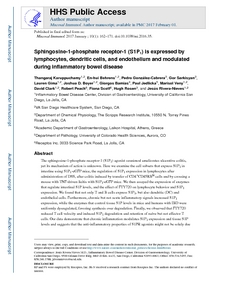Karuppuchamy, T;
Behrens, E-H;
González-Cabrera, P;
Sarkisyan, G;
Gima, L;
Boyer, JD;
Bamias, G;
Jedlicka, P;
Veny, M;
Clark, D;
et al.
Karuppuchamy, T; Behrens, E-H; González-Cabrera, P; Sarkisyan, G; Gima, L; Boyer, JD; Bamias, G; Jedlicka, P; Veny, M; Clark, D; Peach, R; Scott, F; Rosen, H; Rivera-Nieves, J
(2016)
Sphingosine-1-phosphate receptor-1 (S1P1) is expressed by lymphocytes, dendritic cells, and endothelium and modulated during inflammatory bowel disease.
Mucosal Immunology, 10.
pp. 162-171.
ISSN 1933-0219
https://doi.org/10.1038/mi.2016.35
SGUL Authors: Clark, David John
![[img]](https://openaccess.sgul.ac.uk/108138/1.hassmallThumbnailVersion/nihms767073.pdf)  Preview |
|
PDF
Accepted Version
Available under License ["licenses_description_publisher" not defined].
Download (2MB)
| Preview
|
Abstract
The sphingosine-1-phosphate receptor-1 (S1P1) agonist ozanimod ameliorates ulcerative colitis, yet its mechanism of action is unknown. Here, we examine the cell subsets that express S1P1 in intestine using S1P1-eGFP mice, the regulation of S1P1 expression in lymphocytes after administration of dextran sulfate sodium (DSS), after colitis induced by transfer of CD4+CD45RBhi cells, and by crossing a mouse with TNF-driven ileitis with S1P1-eGFP mice. We then assayed the expression of enzymes that regulate intestinal S1P levels, and the effect of FTY720 on lymphocyte behavior and S1P1 expression. We found that not only T and B cells express S1P1, but also dendritic (DC) and endothelial cells. Furthermore, chronic but not acute inflammatory signals increased S1P1 expression, while the enzymes that control tissue S1P levels in mice and humans with inflammatory bowel disease (IBD) were uniformly dysregulated, favoring synthesis over degradation. Finally, we observed that FTY720 reduced T-cell velocity and induced S1P1 degradation and retention of Naïve but not effector T cells. Our data demonstrate that chronic inflammation modulates S1P1 expression and tissue S1P levels and suggests that the anti-inflammatory properties of S1PR agonists might not be solely due to their lymphopenic effects, but also due to potential effects on DC migration and vascular barrier function.
Statistics
Item downloaded times since 12 Jun 2018.
Actions (login required)
 |
Edit Item |


